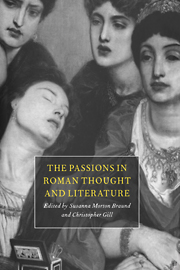Book contents
- Frontmatter
- Contents
- Preface
- Conventions
- Introduction
- 1 Epicurean anger
- 2 Cicero and the expression of grief
- 3 The subjugation of grief in Seneca's Epistles
- 4 A passion unconsoled? Grief and anger in Juvenal Satire 13
- 5 Passion, reason and knowledge in Seneca's tragedies
- 6 Imagination and the arousal of the emotions in Greco-Roman rhetoric
- 7 Pity, fear and the historical audience: Tacitus on the fall of Vitellius
- 8 All in the mind: sickness in Catullus 76
- 9 Ferox uirtus: anger in Virgil's Aeneid
- 10 ‘Envy and fear the begetter of hate’: Statius' Thebaid and the genesis of hatred
- 11 Passion as madness in Roman poetry
- Bibliography
- Index of ancient passages
- General index
Introduction
Published online by Cambridge University Press: 18 December 2009
- Frontmatter
- Contents
- Preface
- Conventions
- Introduction
- 1 Epicurean anger
- 2 Cicero and the expression of grief
- 3 The subjugation of grief in Seneca's Epistles
- 4 A passion unconsoled? Grief and anger in Juvenal Satire 13
- 5 Passion, reason and knowledge in Seneca's tragedies
- 6 Imagination and the arousal of the emotions in Greco-Roman rhetoric
- 7 Pity, fear and the historical audience: Tacitus on the fall of Vitellius
- 8 All in the mind: sickness in Catullus 76
- 9 Ferox uirtus: anger in Virgil's Aeneid
- 10 ‘Envy and fear the begetter of hate’: Statius' Thebaid and the genesis of hatred
- 11 Passion as madness in Roman poetry
- Bibliography
- Index of ancient passages
- General index
Summary
This volume of new essays explores the Roman understanding of emotions. Central to our focus are the intense, problematic emotions which are often called ‘passions’, a term standardly used in connection with the Stoic theory of the emotions. We examine the presentation of these in Roman thought, particularly in philosophy, and in Roman literature. We are especially concerned with the relationship between Roman thought and literature. A central question is whether the most elaborate and famous theory of emotion in the Roman period, the Stoic theory of the passions, is as influential on Roman literature as is sometimes claimed. A special feature of the book is that this question is raised not just in connection with Roman writers who are obviously influenced by philosophy, such as Cicero and Seneca, but also in a range of authors, including Catullus, Virgil, Statius, Tacitus and Juvenal, about whose psychological assumptions there is more room for debate. One of our aims is to develop communication and shared enquiry on this topic between specialists in ancient philosophy and in Latin literature.
In recent years, the subject of Hellenistic theories of emotion and desire has moved increasingly close to the centre of scholarly interest in three interrelated ways. First, the subject has formed part of the current upsurge of research on Hellenistic and Roman philosophy. This has produced a number of excellent studies which can help scholars and students make sense of the Stoic and Epicurean theories of emotion and explore the issues that they raise.
- Type
- Chapter
- Information
- The Passions in Roman Thought and Literature , pp. 1 - 15Publisher: Cambridge University PressPrint publication year: 1997



